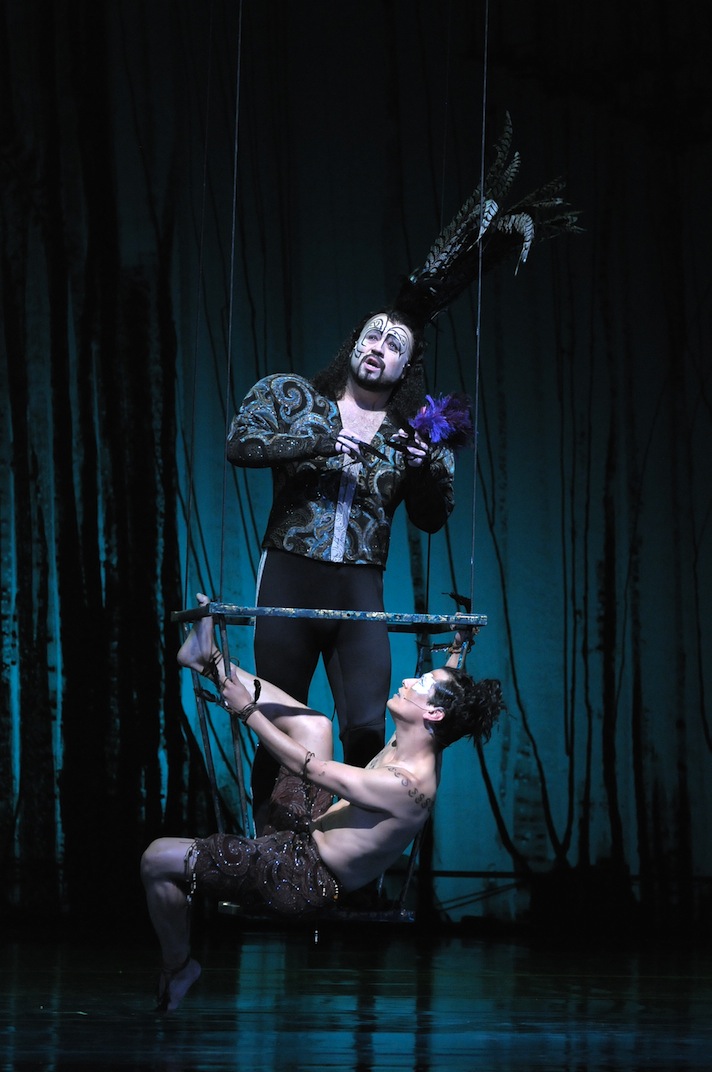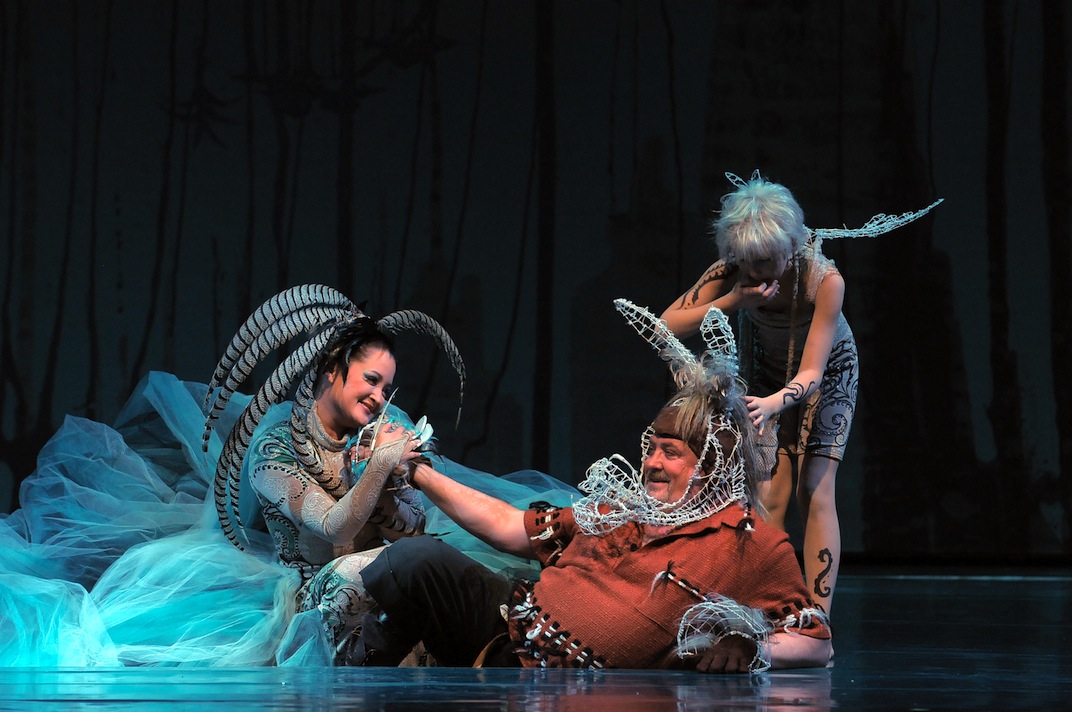Lyric Opera delivers inspired singing and hilarity with triumphant “Midsummer Night’s Dream”

Maybe the Lyric Opera should consider doing an all-Shakespeare season.
Following the success of its season-opening production of Verdi’s Macbeth, the Lyric has once again delivered the Bardian musical goods, scoring a triumph Friday with the company’s first-ever staging of Benjamin Britten’s A Midsummer Night’s Dream.
While the production–what there was of it–was Spartan to the point of nonexistence, with David Daniels leading a winning ensemble cast, the Lyric Opera managed to pull off this difficult work with gleaming vocalism and terrific comic panache.
Written to mark the occasion of an expanded stage at the Aldeburgh Festival, Britten’s 1960 opera was something of a rush job, dashed off in seven months with the composer and his partner, tenor Peter Pears, doing their own deft, extremely faithful editing of Shakespeare’s text.
The result is one of Britten’s most individual creations, a comedy that also has an eerie, unsettling component. Britten scores the part of Oberon, the fairy king, for a countertenor, which conveys a strange otherworldly quality. And while–as usual with Britten–the score is not abundant in memorable tunes, the composer’s witty, endlessly resourceful handling of the vocal and musical lines consistently beguiles the ear. Especially striking is his deployment of varied instrumental palettes for the three strata of characters: for the fairies, harp, celesta, harpsichord and vibraphone; woodwinds and strings for the quartet of human lovers; and bassoons and lower brass for Bottom and his crew.
Leading the large cast is David Daniels as the fairy king, Oberon. Imposing with his facepaint and ostrich plumage, the celebrated countertenor was at his finest opening night, singing with great elegance, tonal purity and clarity. Oberon’s Act 1 aria, I know a bank—the closest thing to an excerptible “hit” in this score—was especially beautifully rendered. Daniels also showed himself a game colleague spending much of the action suspended high over the stage in a small, rickety-looking cage.
As his fractious spouse Tytania, Anna Christy was a regal presence with her mile-long gown train. The soprano handled the vocalism and humor with equal flair, her high voice assaying Tytania’s mock-coloratura with ease.
Britten’s opera can be a very long evening without a cast that can handle the comedy as well as the singing, and fortunately the Lyric has assembled a versatile first-class ensemble.
The four bewitched lovers have some of the finest music in the opera, and–despite being costumed in starkly unflattering American tourist from Hell garb, circa 1961—individually and collectively all rose to the occasion. Shawn Mathey made an impressive Lyric debut as Lysander, displaying a honeyed tenor and proving both ardent and amusing in his sudden post-potion infatuation. Baritone Lucas Meachem was just as comical and vocally assured as the bewitched Demetrius.
The objects of their confused affections were especially fine, with Erin Wall as a clarion-voiced Helena and Elizabeth DeShong, a feisty Hermia. Possessed of a surprisingly ample and deep mezzo, DeShong was especially delightful in her quarrel with Wall, Helena’s insults about Hermia’s being vertically challenged, dead-on for the petite singer.
Britten’s humor, like Shakespeare’s, can be elusive, but with a perfectly cast band of comically gifted singers as the rustic thespians, the final tableaux of “Pyramus and Thisbe” was, for once, genuinely funny and frequently hilarious.
Peter Rose was a hoot as a wonderfully hearty Bottom, leading the band of rude mechanicals, singing with big tone and making every punchline register. Keith Jameson was equally funny, his high tenor well suited to the timid Flute. Sam Handley as Quince, Paul Scholten as Starveling, James Kryshak as Snout and Wilbur Pauley as Snug all blended polished vocalism and deft comic timing delightfully.
The flexibly athletic Esteban Andres Cruz was well suited to the non-singing role of Puck. The Jeff Award-winning actor avoided the annoyance factor as the mischievous sprite, and proved a graceful and rambunctious presence on stage. There is life after working for five years as group sales manager for the Lyric’s ticketing department.
In the belated but crucial roles of Theseus and Hippolyta, Craig Irvin and Kelley O’Connor made a handsome royal couple in their period formalwear. O’Connor, in her company debut, was especially impressive, ravishing in her Jackie Kennedy look, and singing with a gorgeous burnished mezzo. This is one singer that should receive a quick ticket back to Lyric in a larger role.
The cost-effective Houston-Toronto staging is Minimalist in the extreme. Dale Ferguson’s design for the Athenian woods consists of painted back and side drops with primitive arboreal designs. The principal visual element is a massive undulating green plastic sheet that rises and falls to complement the otherwise bare stage. The stark design, with a framing wall and platform for the final scene, doesn’t get in the way but neither did it provide much in the way of atmosphere or scenic splendor.
The young singers of Anima, well drilled by Emily Ellsworth, sang the fairies’ difficult choral music with assurance and clarity. With slight amplification, the featured young sprites (Kenny Lumb, Anna Stephan, Alexandra Oates, and Benjamin Hoppe) were a fine vocal and visual complement to their adult colleagues.
Making an excellent Lyric Opera debut, conductor Rory MacDonald provided a superbly attentive presence in the pit, closely supporting the singers, making every trumpet rimshot register, and consistently elucidating the ingenuity of Britten’s score. All credit to director Neil Armfield as well who made seamless the tricky blending of music and comedy.
One last debut to note: Kiowa, the black lab-retriever mix who made his first stage appearance Friday as Starveling’s dog. Though a bit restive on opening night, the former service dog for Canine Companions for Independence was a fine four-legged complement to the rustics’ high-jinx.
A Midsummer Night’s Dream runs through Nov. 23. lyricopera.org; 312-294-3000.
Posted in Performances



